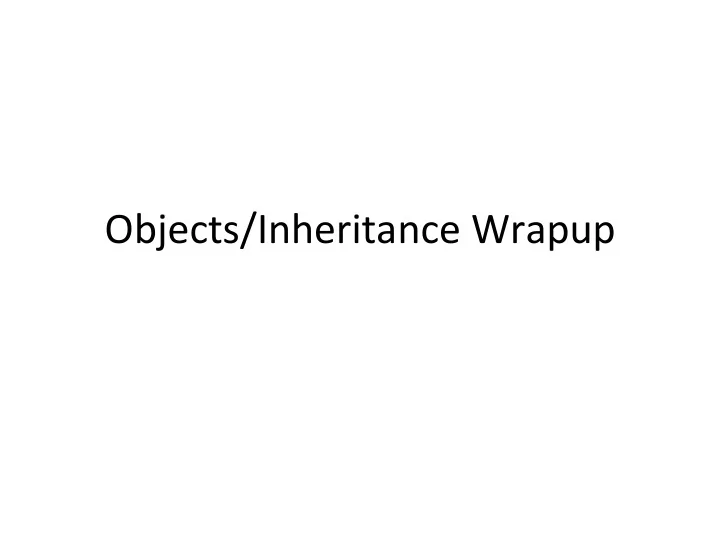

Objects/Inheritance ¡Wrapup ¡
• Class : ¡descrip5on ¡of ¡a ¡data ¡type ¡that ¡can ¡ contain ¡fields ¡(variables) ¡and ¡methods ¡ (func5ons) ¡ – Think ¡of ¡a ¡class ¡as ¡a ¡template ¡for ¡crea5ng ¡objects. ¡ • Object : ¡a ¡par5cular ¡instance ¡of ¡a ¡class. ¡ point ¡is ¡the ¡class. ¡ class ¡point ¡{ ¡… ¡}; ¡ p1 ¡and ¡p2 ¡are ¡objects ¡ point ¡p1, ¡p2; ¡ of ¡the ¡point ¡class. ¡
• When ¡a ¡class ¡is ¡a ¡par5cular ¡kind ¡of ¡another ¡ class, ¡use ¡ inheritance . ¡ class ¡X ¡{ ¡void ¡f(); ¡}; ¡ class ¡Y ¡: ¡public ¡X ¡{ ¡void ¡g(); ¡}; ¡ void ¡X::f() ¡{ ¡cout ¡<< ¡"Base ¡f"; ¡} ¡ void ¡Y::g() ¡{ ¡cout ¡<< ¡"Derived ¡g"; ¡} ¡ ¡ Prints ¡"Base ¡f" ¡ X ¡ex; ¡Y ¡why; ¡ ex.f(); ¡ Prints ¡"Base ¡f" ¡ why.f(); ¡ Prints ¡"Derived ¡g" ¡ why.g(); ¡
• A ¡derived ¡class ¡is ¡allowed ¡to ¡ override ¡methods ¡ in ¡the ¡base ¡class. ¡ class ¡X ¡{ ¡void ¡f(); ¡}; ¡ class ¡Y ¡: ¡public ¡X ¡{ ¡ void ¡f(); ¡}; ¡ void ¡X::f() ¡{ ¡cout ¡<< ¡"Base ¡f"; ¡} ¡ void ¡Y::f() ¡{ ¡cout ¡<< ¡"Derived ¡f"; ¡} ¡ ¡ X ¡ex; ¡Y ¡why; ¡ Prints ¡"Base ¡f" ¡ ex.f(); ¡ why.f(); ¡ Prints ¡"Derived ¡f" ¡
• If ¡a ¡derived ¡class ¡overrides ¡a ¡method, ¡the ¡ overridden ¡method ¡code ¡can ¡s5ll ¡call ¡the ¡base ¡ class ¡version ¡of ¡the ¡method ¡if ¡needed. ¡ class ¡X ¡{ ¡void ¡f(); ¡}; ¡ class ¡Y ¡: ¡public ¡X ¡{ ¡ void ¡f(); ¡}; ¡ void ¡X::f() ¡{ ¡cout ¡<< ¡"Base ¡f"; ¡} ¡ void ¡Y::f() ¡{ ¡ X::f(); ¡ cout ¡<< ¡"Derived ¡f"; ¡} ¡ ¡ Prints ¡"Base ¡f" ¡ X ¡ex; ¡Y ¡why; ¡ ex.f(); ¡ Prints ¡"Base ¡f ¡Derived ¡f" ¡ why.f(); ¡
• Some5mes ¡a ¡class ¡needs ¡access ¡to ¡"itself" ¡as ¡a ¡ stand-‑alone ¡object: ¡ ¡ class ¡X ¡{ ¡void ¡f(); ¡}; ¡ ¡ void ¡g(const ¡X ¡& ¡ex) ¡{ ¡… ¡} ¡ ¡ void ¡X::f() ¡{ ¡ ¡ ¡// ¡how ¡can ¡I ¡call ¡g ¡on ¡myself? ¡ } ¡
• Every ¡object ¡has ¡a ¡special ¡variable ¡called ¡ this ¡ that ¡is ¡available ¡to ¡be ¡used ¡inside ¡any ¡method ¡ in ¡the ¡class. ¡ • this ¡is ¡always ¡a ¡pointer ¡to ¡the ¡object ¡itself. ¡ • In ¡other ¡words, ¡for ¡a ¡class ¡X, ¡the ¡data ¡type ¡of ¡ this ¡is ¡ X* . ¡
• Some5mes ¡a ¡class ¡needs ¡access ¡to ¡"itself" ¡as ¡a ¡ stand-‑alone ¡object: ¡ ¡ class ¡X ¡{ ¡void ¡f(); ¡}; ¡ ¡ void ¡g(const ¡X ¡& ¡ex) ¡{ ¡… ¡} ¡ ¡ void ¡X::f() ¡{ ¡ ¡ ¡ g(*this); ¡ } ¡
• We ¡know ¡that ¡the ¡keyword ¡const ¡declares ¡ that ¡a ¡func5on ¡will ¡not ¡change ¡an ¡argument: ¡ ¡ void ¡g(const ¡vector<int> ¡& ¡vec) ¡{ ¡… ¡} ¡ ¡
• We ¡know ¡that ¡the ¡keyword ¡const ¡declares ¡ that ¡a ¡func5on ¡will ¡not ¡change ¡an ¡argument: ¡ ¡ void ¡g(const ¡vector<int> ¡& ¡vec) ¡{ ¡… ¡} ¡ ¡ • This ¡const ¡keyword ¡can ¡also ¡be ¡used ¡with ¡a ¡ class's ¡methods ¡to ¡declare ¡that ¡the ¡method ¡ will ¡not ¡change ¡any ¡of ¡the ¡object's ¡fields. ¡ ¡
class ¡point ¡{ ¡ ¡ ¡public: ¡ ¡ ¡ ¡ ¡ ¡int ¡get_x(); ¡ ¡ ¡ ¡ ¡int ¡get_y(); ¡ ¡ ¡private: ¡ ¡ ¡ ¡ ¡int ¡x, ¡y; ¡ }; ¡ int ¡point::get_x() ¡{ ¡ ¡ ¡return ¡x; ¡ } ¡ int ¡point::get_y() ¡{ ¡ ¡ ¡return ¡y; ¡ } ¡ ¡ ¡
class ¡point ¡{ ¡ ¡ ¡public: ¡ ¡ ¡ ¡ ¡ ¡int ¡get_x() ¡ const ; ¡ ¡ ¡ ¡ ¡int ¡get_y() ¡ const ; ¡ ¡ ¡private: ¡ ¡ ¡ ¡ ¡int ¡x, ¡y; ¡ }; ¡ int ¡point::get_x() ¡ const ¡{ ¡ ¡ ¡return ¡x; ¡ } ¡ int ¡point::get_y() ¡ const ¡{ ¡ ¡ ¡return ¡y; ¡ } ¡ ¡ ¡
Recommend
More recommend